By Emily Arntsen
News at Northeastern
A woman in a soundproof studio sits down at a computer and adjusts a headset microphone in front of her mouth.
She’s going to donate her voice. What she’s about to say will eventually be turned into a synthetic voice for a woman who needs text-to-speech technology to communicate.
The computer prompts her:
“Your personality’s central organ is your voice.”
Related article:
Rupal Patel: The Gift of a Voice, Helping People Who Are Unable to Speak
The donor repeats the phrase into the microphone, the first of about 2,000 sentences she will need to record in order to capture the full range of her voice.
The opening phrase reflects the central goal of Northeastern’s Voice Preservation Clinic, which is in partnership with Northeastern professor Rupal Patel’s company, VocaliD—to provide people who use text-to-speech technology with voices that are unique to them.

Northeastern professor Rupal Patel has a joint appointment in the Khoury College of Computer Sciences and the Bouvé College of Health Sciences. Photo by Ruby Wallau/Northeastern University
“If your voice sounds like an ATM or an Alexa device, how can you take ownership over that prosthesis? It doesn’t feel like an extension of you anymore,” she says. “Yet, if you could continue speaking the way you used to, a social connection is maintained.”
The clinic opened in September for people to either donate their voices to someone else or record their voices for themselves in case they need text-to-speech assistance in the future.
For someone who has never been able to speak due to conditions like cerebral palsy or severe autism, VocaliD can blend a donated voice with the nonverbal sounds from a recipient to create a personalized voice that represents what that person would sound like if she could speak.
VocaliD also works with people who are at risk of losing their voices because of conditions like throat cancer or amyotrophic lateral sclerosis, for example. These people bank their voices at the clinic and make synthetic voices if they need them in the future.
It takes about two to three hours to donate or preserve a voice. These people can choose from a selection of science fiction stories, mysteries, world history, or horror. “At about 500 sentences, people usually start to slow down,” Patel says. “So we try to make the reading material interesting.”
VocaliD doesn’t require recordings to be done at the Voice Preservation Clinic, which is located on the Boston campus at the Speech-Language and Hearing Center.
But a partnership with the university provides people who want to donate or preserve their voices with access to high-quality microphones in a soundproof space.
“You’re going to be using this voice for the rest of your life,” Patel says. “You want the recordings to be the best quality.”
The clinic, which was recently awarded the Healthcare Voice Experience of the Year, is the first of what Patel hopes could be many clinics at other Northeastern campuses and beyond.
“Innovations are not just technological. They are about access,” Patel says. “In the past, a personalized voice would be hundreds of thousands of dollars.”
Now, VocaliD offers this service for $1,499.
“These people have such important things to say,” Patel says. She’s giving them the tools to do so.
(Reprinted with permission from News at Northeastern.)















